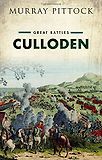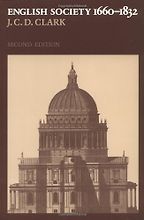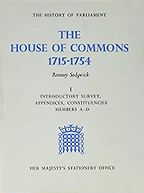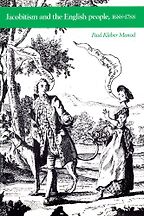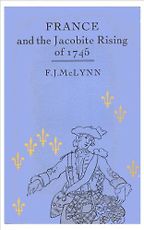Jacobitism has always had a bit of a romantic allure for me — maybe because I read Sir Walter Scott’s Waverley when I was 18 or had some romantic image of Charles Edward Stuart—Bonnie Prince Charlie—in my mind. It all seems very vivid which is unusual, I guess, for something that happened in the 18th century. Perhaps you can start by explaining what Jacobitism is and why that might be?
The word ‘Jacobitism’ means loyalty to the exiled Stuarts, after James VII of Scotland and II of England was deposed by the English parliament in January 1689, and the Scottish parliament a couple of months later. James had already fled to France. The Jacobite cause involved loyalty to James—and his son and later grandson, Charles Edward Stuart—and a desire to restore them to the crowns of England, Scotland, and Ireland.
That sounds hopelessly outdated—out of another world—but there are contemporary resonances, which is one of the reasons that Jacobitism has a resonance that the Wars of the Roses, and other dynastic struggles of long ago, do not have.
The English Jacobites wanted the Stuarts back because of a dislike and distrust of foreigners — particularly the Dutch and Germans. They also believed the Church of England had been critically undermined by having a Lutheran at the head of it. And, thirdly, there was a distrust of finance and big capital concentrated in the Bank of England, the pursuit of a debt-financed war policy, which was one of the key developments of the post-1689 regime under William and his successors including the Georges.
“ Samuel Johnson said in 1777 that if there were a referendum in England, people would vote for the restoration of the Stuarts.”
Scottish and Irish Jacobites, with slightly different emphases, were fighting for the return of the Stuarts, which was, for the Scots, their native dynasty. In Scotland’s case, after 1707, it was also about the return of the Scottish parliament and an end to the Acts of Union. In Ireland’s case, it was about an appropriate and emancipated place for Catholics within Ireland.
Both Scottish and Irish Jacobites—and, to an extent, English Jacobites, though it was never a big issue for them—favoured what the Stuarts had espoused in the 1660s, 70s, and 80s which was a kind of multi-kingdom monarchy with a royal capital in London and subsidiary royal capitals and parliaments in Edinburgh and Dublin. Until 1707, Scotland was an independent country, Ireland was not. It was, if you like, a confederal model, a British Isles that was very de-centred.
One of the key things that happened after 1689—and the Acts of Union with Scotland were part of that, though not the only part—is that the British Isles became increasingly centralised, with a concentration of royal administrative power in London. I think you can see there some of the issues that makes Jacobitism still have contemporary resonance.
Do the Jacobites come up in contemporary debates about Scottish nationalism?
It doesn’t really come up in contemporary debates except that there’s a sense in which the Jacobites are forerunners or avatars of modern Scottish nationalism.
“The English Jacobites wanted the Stuarts back because of a dislike and distrust of foreigners — particularly the Dutch and Germans.”
Interestingly, Jacobitism was much more core to the language of Irish nationalism. It wasn’t finally adopted, but the initial marching song for the Irish volunteers in 1913—who subsequently undertook the 1916 rising—was “Tearlaich Og,” “little Charles,” which was a direct reference to Charles Edward Stuart. Of course that is not the case for the modern Irish state, but the language of Irish nationalism retained Jacobite overtones right into the 1920s.
Looking down the list of the books you’ve chosen, am I right to think that Jacobitism is important for understanding what was happening in 18th century England?
It is and it’s also important for understanding what’s happening in Europe and the British Empire. The debt-fuelled economy drove a British state that was on a semi-perpetual war footing with France in particular, but sometimes also with Spain. It was geared to the development of an overseas British Empire.
Get the weekly Five Books newsletter
Jacobitism was a threat to the development of that empire — not only by dividing (as the British crown would have seen it) the British Isles, but also because a restored Stuart would have been much more open to a rapprochement with France, rather than overt competition. One of the interesting ‘what if?’ games of Jacobitism is that if they had won in 1745—they probably wouldn’t have, of course, but if they had—then there wouldn’t have been the Seven Years’ War with France in Canada and India. So Quebec wouldn’t have fallen. That means there would have still been French troops north of the American 13 colonies, which would have meant that there was too great a military threat for them to rebel and begin the American War of Independence in 1776. There were global consequences to the victory or otherwise of the Jacobite cause.
Yes, you discuss this in your book about the battle of Culloden. Can you tell me why you wrote the book?
I wrote it as a contribution to Oxford University Press’s Great Battles series, but I was asked to do that because of the long standing research work I’ve done on the composition, nature and arming of the Jacobite army in 1745.
Do lots of people visit the battle site?
Yes. Culloden has between 100.000 and 200.000 paying visitors a year, but you can also walk on the battlefield for free, so the norm is to double the number of paying visitors.
Is this romantic tinge the story has a good or a bad thing?
It hasn’t always been helpful. In the middle of the 18th century British historiography demonised the Jacobites because they were still a terrible political threat. Subsequently, one of the ways in which there was reconciliation within the British Isles between England and Scotland (not so much Ireland) was by incorporating the Jacobites into a kind of story. The Scots are really loyal: their loyalty was misplaced on this occasion, but the many Scots who fought with the Jacobites were virtuous to have fought — particularly Highland Scots, though the Jacobite army wasn’t majority Highland but that’s another issue.
“It was a permissible past as long as it was sentimentalised — because anything that’s sentimentalised is already dead. It never comes back.”
That was the story. Therefore, that loyalty, properly deployed in the service of progress and modernity, could sustain and defend the British Empire. So it’s about doing the wrong thing for the right reasons, and that’s how the romantic element of Jacobitism really started to develop. It was a permissible past as long as it was sentimentalised — because anything that’s sentimentalised is already dead. It never comes back. “Will Ye No Come Back Again” is a song guaranteeing you’re never going to come back. Phew. That saves us from that problem.
Let’s go through the books you’ve chosen. Your first one is Jonathan Clark’s, which is about English Society 1688-1832 (1985). I know this is a seminal work and I still have my copy from undergraduate days. I gather the current edition is a bit less polemical than my own, but it’s quite a hard book to read unless you’re familiar with the 18th century.What’s the book about and what is it trying to say?
It is not an easy read, that’s true, but it is a terrific book. Clark argues that the British state, in the 18th century, was a confessional and an aristocratic state. It was very strongly Anglican and very strongly aristocratic. That aristocratic influence continued long after, even, the Reform Act of 1832.
It wasn’t progressive. It wasn’t interested in the ideas of John Locke. Clark came up with the idea that Locke wasn’t influential at a time when people thought he was. There’s now quite a lot of digital humanities, data-driven analysis of 18th century texts which supports Jonathan Clark’s thesis that Locke’s ideas were not particularly influential. But it was inspirational 30 years ago.
“Clark came up with the idea that Locke wasn’t influential at a time when people thought he was.”
I’ve tried to stay off books about Scottish or Irish Jacobitism specifically to be able to look at them more generally. Clark does have a bit about Jacobitism in the book, but by presenting this version of society, the fundamental issue he shows is that Jacobitism was normative.
The idea that British society was progressive and the Jacobites were wild men from the hills who were just off their nut is completely blown apart by Clark’s book. He shows that what it’s fundamentally about is who controls an aristocratic and church-dominated state. It is not about fighting progressive modernity from the backwoods: it is about which party (and he argues—as many others have since argued—that the Tories will remain largely Jacobite up to the 1760s) is going to control that state. That’s fundamentally a political question. It makes Jacobitism far more serious. And it takes you well out of that kind of slough, which we still live with, which is that the Jacobites are dirty and hairy and that the forces facing them are progressive and interested in democracy.
So he was going against what was the historical orthodoxy at the time he was writing.
Absolutely, that’s one of the reasons Jonathan Clark’s book was very polemical. He goes against the historical orthodoxy and accuses that orthodoxy of presentism, of saying, ‘We got here because we were always going to get here because this is the way people thought in the 18th century, and that’s how progress has happened.’ Whig history, in other words: the idea that there is a development from the idea of rights, and property rights, to the ability of ordinary people to take on their rulers, to a modern democracy. He is saying that’s actually just a comforting story that democracy is telling itself.
So it was not between old and new, it was just political rivalry between two groups and that’s the Whigs and the Tories.
That’s right. There are other dimensions to Jacobitism, but basically it is about contestation of who controls the structures of what is a fairly conservative, aristocratic, confessional or religious state, with extensive monarchical power.
OK so to understand that rivalry a bit more fully, let’s look at your next book, which is from The History of Parliament, about the period from 1715-54 (1970) — to be more specific, the section by Eveline Cruickshanks.
I chose this book because, like Jonathan Clark’s work, it was an absolutely seminal book. It destroyed the idea—which was then the absolute orthodoxy and associated with the work of Sir Lewis Namier—that there were no real political parties in the 18th century, just groups of people jostling to maintain their self-interest. By looking very, very closely at the lives and actions of individual members of parliament, Eveline Cruickshanks demonstrates the existence of political parties. Of course, once your demonstrate the existence of political parties, you are demonstrating the existence of divergent political goals.
“The Tories were excluded from power for 48 years in fact, from 1714 to 1762.”
Her case has always been—in the work she’s done following that text—that those divergent political goals were Jacobite versus non-Jacobite. Most scholars don’t go all the way with her on that. But, crucially, she is defining the conflicts of the 18th century in terms of political parties rather than in terms of individuals. That’s never been seriously attacked since, far less overturned.
Once again, as Jonathan Clark was to do later with a much more comprehensive study, she is the first to set the scene for the idea that Jacobitism is about contestation about who wins and who controls the political process, rather than a battle between that process and people whose values are completely anachronistic to it.
So right now, in the UK, we have Labour and Tories in parliament. At that time, was it the Whigs and Tories in parliament, with the Tories supporting the restoration of the Stuarts and the Whigs supporting the Georges?
There remains a big debate about just how many Tories supported the restoration of the Stuarts. Certainly some did. Eveline Cruickshanks, to this day, believes that most or nearly all of them did, but there is quite a debate about that. Some Tories definitely supported the restoration of the Stuarts, and the Whigs opposed it: very much so. The Whigs were also associated with being pro-war with France to a much greater extent than the Tories were. There were a lot of attacks on the Tories for making peace, the Peace of Utrecht, in 1713, from the Whigs.
“Without London, you hadn’t got the central economic power, and if you didn’t have the central economic power, there’s only one long-term outcome for your campaign: you will lose.”
But if you just step back you see that neither George I or George II were prepared to see the Tories in power. The Tories were excluded from power for 48 years in fact, from 1714 to 1762. George III, the first Hanoverian born in England—a new broom—was a young man of 22 when he came to the throne in 1760. He introduced a Tory prime minister for the first time: Bute, who was also the first Scottish prime minister. Throughout the 1760s there were popular attacks, particularly in London, on Scots as closet Jacobites. That was very powerful and showed the antipathy and characterisation of the Tories as Jacobite was still there.
Bute lasted in power just over a year. Even in the 1760s it was very difficult to sustain a Tory administration. The exclusion of the Tories from government is a smoking gun that they weren’t trusted to support the Hanoverian dynasty.
What other ideological differences were there between the Whigs and the Tories?
To be fair to Sir Lewis Namier, there’s a lot of overlap. There are a lot of people in these two parties that believe the same things. That’s hardly surprising because there are a lot of people in different political parties in the UK today who believe the same things in quite a number of areas.
But apart from Jacobitism, the key dividing lines would be: the Tories would be strongly against dissent: that is non-conforming Protestant churches in England. The Tories would also be likely to support the country interest, the the rural squirearchy against the interests of the City of London in particular, and the financial markets.
Let’s go on to the third book you’ve chosen, which is Paul Monod’s Jacobitism and the English People (1989).He’s using lots of sources—newspapers, poetry—to show the importance of Jacobitism in English society, is that right?
Yes, and this book is pivotal because no book has attacked it successfully, or replaced it, since it first appeared in 1989. It comprehensively goes through a huge range of records—including 2000 seditious words prosecutions against ordinary butchers, bakers and candlestick makers in the west of England. It looks at anecdotes, at folk memory, at the way radicals often followed Jacobite routes when they were protesting in the early 19th century—to present a picture of popular Jacobitism. Everything from non-conformist chapel burning to saying ‘God Save King James’ in the street. He demonstrates that it’s not just at the political top end. There’s a depth of interest and support for Jacobitism in English society that’s evident in the way Jacobitism is frequently used as a catch call or a motivator for crowds who are gathered together to protest about other issues.
So do you think that’s genuine support for the restoration of the Stuarts or something else?
That’s the thing about Jacobitism, if you look at it as a political option and a political process—rather than some kind of wild-man-from-the-hills stuff— then you’ve got to separate the Jacobites who are prepared to fight and prepared to conspire and, therefore, risk execution from people who would vote for them in a referendum. Samuel Johnson said in 1777 that if there were a referendum in England, people would vote for the restoration of the Stuarts. Goodness knows if he was right or wrong. It’s totally unscientific and YouGov was not there to help. I happen to think he’s probably wrong, but nonetheless, we’re looking at a whole range of identifications.
“ There were global consequences to the victory or otherwise of the Jacobite cause.”
Just like today there’ll be people in the Brighton who’ll be turning up for every Labour Party motion in support of Jeremy Corbyn. Then there are other people who think they’ll vote Labour but not while Jeremy Corbyn is leading it. The Jacobites were like that too. Do you support a restoration? Yes, that would be nice. Yes, if I can stop having my common grazing turned into rentable property by the landowner, that would be nice. If I can get this, then it would be nice if the Stuarts were restored. If they can do this, then I would back them.
All that is there, but the issue is that expressing even very, very limited verbal sympathy with the Jacobite claim could, in the wrong circumstances, get you up to two years imprisonment. So the fact there was so much of it is quite impressive.
The next book is about the 1715: The Great Jacobite Rebellion (2006) by Daniel Szechi.
I chose this book because it’s the only really modern study of the Great Rising of 1715, replacing the study done in the 1930s. There are a lot of things that are good about it, but one is the detailed research on the level of support the Jacobites commanded and the fact there are English Jacobites involved. We’re talking about a 90%+ Scottish army. The support for the repeal of the Union, and also the size of the army…
Which was what?
Daniel Szechi demonstrates that the size of the Jacobite army was 22.000, which was enormous because it meant that 1 in 6 adult males in Scotland actually fought. That was about two thirds of the maximum number — of ‘fencible’ men, that is men who can be raised for military service in Scotland, who could fight, at that time. So what we’re looking at is a national rising and enormous levels of military support. These are people who are not just risking their lives in the battlefield, but risking their lives if captured because they are traitors in the eyes of the government, not prisoners of war. It is a staggering demonstration of the military power—incompetently led in 1715—but the military power that Jacobitism could generate.
The bibliography on the Jacobites must be absolutely enormous. Does most of it focus on the ’45 which was a bit more exciting than the ’15?
Yes. The ‘15 was not so well led because it wasn’t authorised by James III and VIII (as his supporters would have called him) and he actually landed several months after it started at Peterhead. By that time, it was already in retreat. Its very poor leadership at the hands of the Earl of Mar is a significant factor in people not finding it as exciting a rising as the lightning dash to London, practised by Charles Edward Stuart 30 years later.
But how did it happen that James arrived too late for the uprising?
Mar jumped the gun and effectively launched the rising. As he said in one of the commissions he granted, whether King James was restored or not, the aim was to address the grievances of Scotland and end the Union.
Scotland’s union with England had happened in 1707. So can the 1715 be viewed as a reaction against the Union?
It absolutely can. Yes, Mar wants to restore James. But, although he voted for the Union at the time, his overwhelming aim is to end the Union.
What? Why did he change his mind?
Such is politics.
Let’s talk abour your final book which is France and the Jacobite Rising of 1745 (1981) by Frank McLynn. How does this fit in?
What this book does is that it demonstrates, beyond reasonable doubt, both the size of the French effort which went astray because of bad weather in 1744 to support the Stuarts, and the extent to which France was seriously planning a landing in 1745. The big problem was that when Charles Edward Stuart was at Derby, his communication lines with France were simply not good enough to understand or communicate about the nature and timing of a French landing. McLynn demonstrates from the archives that that landing was very much on the cards, and that it would have been spearheaded by Irish troops in the French service of whom there were several thousand, with the French troops only as a backup. I’m not sure the French were right about this. France did, of course, reinforce the Jacobites in Scotland quite extensively, but it was the major landing in Essex (or elsewhere, but Essex was a favourite spot) that was the fear of the British government in 1745, and for which the French were actively planning,
But it didn’t happen.
It didn’t happen. The French became aware of Charles Edward’s retreat and, therefore, it didn’t happen. They moved to reinforcing him in Scotland. Of course, there’s a school of thought that says, ‘Yes, all this material is in the archives, but would the French really have done it?’ As far as French landings go, there’s always this, ‘after you, after you. Will you commit? If you commit, I’ll commit.’ It’s like two people can’t make up their mind which restaurant to go to.
“People say, ‘Well, he turned into an alcoholic.’ Normally one says to them, ‘If you lost your job at 25 and didn’t get it back before you died, wouldn’t you?’ ”
But the point about Frank McLynn’s book is that it does demonstrate serious intention to launch a French invasion in 1745, and that had not been demonstrated before. I happen to think the odds would have been against him, ultimately, but if Charles Edward had advanced on London, he would almost certainly have reached it because there would only have been 1700 troops (including the Black Watch who weren’t trustworthy) between him and London. If the French had set sail on the news that Charles was approaching London and had landed the initial force of around 6000 men in Essex, then things could have got very interesting — or terrifying depending on your point of view.
And Charles Edward did want to carry on from Derby, didn’t he? He didn’t want to turn back.
Yes, and he was completely right about that. People still say, ‘Why didn’t he stop at the border?’ If he really wanted an independent Scotland, why did he go to England?’ But the thing that had destroyed Charles I in the Wars of the Three Kingdoms or the civil war was that, after the Battle of Edgehill, he didn’t advance on London. Charles Edward did not make that mistake.
“If the Stuart Scottish army had won at Culloden, it would not ultimately have changed the outcome of the war.”
Every moment, every week, every month, that London remained unoccupied, unattacked, unapproached, parliament could continue to vote more and more national debt. That would enable—as it did enable in 1745—Hessian and other mercenaries to come over to bolster the British army and increase the force that it could bring to bear, and also made it possible to press more men for the Royal Navy to screen French ships.
Basically, without London, you hadn’t got the central economic power, and if you didn’t have the central economic power, there’s only one long-term outcome for your campaign: you will lose. Charles was absolutely right to move on London. He was immensely frustrated when his commander forced him to turn back.
Are you generally a fan of his?
I’m not sure it’s appropriate to be a ‘fan’ of people in history. One has to see the man in the round. He was a man of great talent. He had significant strategic insight, though he wasn’t very good, operationally, in battles. He understood what was necessary. He was certainly a glamorous and determined figure. He was very interested in a wide range of things and people. He was interested in French thinkers, like Montesquieu. He followed the American War of Independence blow-by-blow as it was developing when he was in exile.
People say, ‘Well, he turned into an alcoholic.’ Normally one says to them, ‘If you lost your job at 25 and didn’t get it back before you died, wouldn’t you?’ He lived for the whole of his life, not altogether creditably, on the basis of an episode that happened when he was 25, 26 years old. That’s a terrible thing to carry with you, if that’s the highest point of your entire existence.
Although there are worse places than Italy to retire to. I grew up in Frascati, where his brother Henry was bishop, and where Charles Edward was, initially, buried. It’s quite nice.
His brother was the retiring type, but he was not. He wanted the crown. He was active, he was engaged, he was a man who had no outlet for his talents after 1746.
There’s a thread that I’ve been detecting through your comments, that you don’t really think this was a rebellion that nearly succeeded. You’re sceptical about how in-the-balance it was in terms of restoring the Stuarts to the throne in 1745.
First of all, there’s Culloden. That would have changed nothing. If the Stuart Scottish army had won at Culloden, it would not ultimately have changed the outcome of the war.
Had they occupied London, they did have a chance. There were two big armies in the field who couldn’t have reached London in time. One of them was Cumberland’s. The other was Wade’s at Newcastle. Wade was very ineffective as a commander, and didn’t seem to be that interested in trying to intercept the Jacobites. So you can rule him out of the equation.
“There was systematic starvation rather like Stalin and the Ukraine in the 1930s.”
The question is, if the capital had fallen to the Jacobites, what would have happened to the morale and determination of Cumberland’s men? If he’d been able to hold them together then he would probably have had, before the French got there, enough men to see off the Jacobites — particularly because previous history shows the Jacobites were not good at street fighting. A lot of London would have been hostile to them as well. Even though they could have managed to occupy it, they wouldn’t have taken strongholds like the Tower and so on.
On the other hand, if George II had left in his yacht for Hanover, leaving Cumberland in the field with an army, and it was known that George II had left, and there were question marks over the Bank of England and the national debt…It was really a matter of morale and timing. Cumberland could have reached London in 2 or 3 days after the Jacobites got there, and that might have been enough. But if, for any reason, he was held up for a week or two, that might not have been enough because he would have faced the consequences of a rapidly accumulating level of doubt and anxiety about the sustainability of the state his dynasty had helped to create.
The other issue is how many English Jacobites would have come out of the closet if the Jacobite army had occupied London. I still think the ultimate defeat was likely but if they had got to London they did have a chance.
And the suppression was brutal.
It was absolutely brutal. It was suggested—even by moderate figures like Forbes of Culloden—that entire clans, entire groups in a particular landholding who for various reasons took the name of the landlord, should be deported. There was systematic starvation rather like Stalin and the Ukraine in the 1930s. There was also a longstanding British army occupation in Scotland — not just in the Highlands, but right across the country for almost 15 years after the Jacobite defeat at Culloden in 1746. Then there was Fort George, recently in the news because it’s no longer going to be a military base for the first time since 1746. A huge amount of money was spent on that, in terms of British GNP, which shows just how worried the British government and the Georges were.
Interview by Sophie Roell, Editor
January 26, 2017. Updated: July 10, 2020
Five Books aims to keep its book recommendations and interviews up to date. If you are the interviewee and would like to update your choice of books (or even just what you say about them) please email us at [email protected]
Five Books interviews are expensive to produce. If you've enjoyed this interview, please support us by donating a small amount.

